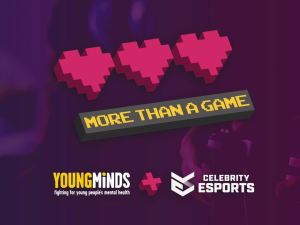As esports continues to develop and grow, organisations, tournament operators and publishers have prioritised attracting a mainstream audience.
Over the last couple of years, publishers have struck deals with traditional media partners to broadcast esports competitions, such as League of Legends and Rocket League being aired on the BBC iPlayer. Organisations have also signed famous ambassadors and collaborated with a range of non-endemic brands to strengthen their global appeal.

RELATED: Vodafone Giants partners with Deloitte Gaming
Celebrity Esports launched in 2020 and has identified the need to build a stronger bridge between mainstream media and the esports sector. The firm has created the CES Superstar League, a new esports competition that sees 12 celebrities, spread across six teams, battle with and against fans across a range of titles.
To find out more about this unique concept, Esports Insider spoke with Leo Skagerlind, the Chief Executive Officer and Founder at Celebrity Esports, and Richard Farleigh, formerly of Dragons Den and the organisation’s Chairman.
Edging away from traditional esports characteristics, the CES Superstar League is a competition built to blend esports and mainstream celebrities together, all with the purpose of providing another gateway for the sector to be seen by new demographics.
Skagerlind commented: “I say we’re not a purist [in esports], we are nowhere near a purist, we’re more of the kindergarten. It’s an entry-level for anyone of any age to come in and go, ‘that’s really cool’.
“If anyone wants to go further up into the pyramid, which is purer, I think we open the gates to that because it gives the environment for people who might enjoy watching gaming online, and then they can go into the other things. So I think we are at the start of esports, we are definitely not a challenger to the pyramid, we are at the base.”
Farleigh highlighted the importance of launching an esports competition designed towards a mainstream audience, with the league potentially expanding competitive gaming’s reach to more neutral audiences.
“The CES Superstar League is opening up esports to potentially a market that hasn’t been tapped before, so that we could actually boost the popularity of esports,” Farleigh added. “Even though they’re boosting our popularity, we’re going to return the favour and boost their popularity.”

Celebrity Esports is not designed to attract esports purists, but it does plan to act as a gateway to fans that might develop an interest in competitive gaming. As such it was imperative that the CES Superstar League found the right balance between traditional esports methods and fan engagement activations.
“I think balancing the CES Super League is the tricky bit,” Skagerlind added. “Obviously, esports is very much run with fantastic games such as Call of Duty, League of Legends, and Fortnite.
“I think for our audience and our celebrities, we needed our games to be far more user-friendly and easier to play. What we wanted to create was more entertainment for the player, rather than the game focus. The game focus is there, but it’s not our primary goal.”
Whilst the titles for the CES Superstar league have yet to be confirmed, Celebrity Esports did reveal to ESI that the firm is in “final contract discussions” with publishers such as Ubisoft and SEGA. The league is also expected to feature titles from British publishers such as Team17 and Codemasters.

When it comes to utilising celebrities in any sector, it is crucial that the correct names are selected to drive interest. Skagerlind highlighted that the participants have an average of one million followers on Instagram, alongside their various other social media channels. However, whilst having a following is important, according to the firm’s CEO, it is not the most important factor.
Skagerlind said: “I’ve watched a lot of celebrities, and famous people online playing charity matches and the first thing, as a viewer and as a non-purist, is identifying what I am watching and how am I going to be entertained.
“The way we recruit our celebrities is based on entertainment first, rather than their name. We could get the biggest superstar in the world, but personality-wise they might not fit the on-screen person that we want.”
Farleigh also explained that having the correct celebrities involved can also immediately attract a casual viewer who is a fan of that individual. “It’s interesting content. That’s what it’s all about. It’ll be fun for non-gamers to watch, but also for gamers to watch.
“I’m sure if you’re into one of the games, you’d love to watch someone you’ve seen on the sports field or on the TV screen have a go at the game you love.”
So far, content creator SV2 has been announced as one of the personalities involved alongside a Love Island trio of Nas Majeed, Chris Hughes and Kem Cetinay. More names are expected to be revealed in due course.

Unlike most celebrity tournaments, CES Superstar League will create branded teams for the competition. A celebrity pair will be joined by fans to create a CES Super League esports team, which opens up the opportunity for sponsorship and merchandise sales during the competition.
“I think it gives identity to what you’re watching and the team element of the competition,” Skagerlind said. “We have six teams, two celebrities in each team, which gives us more of a traditional way of watching sports.
“To have brands attached to those teams gives us the funding that we need to move forward. It’s a way to commercialise our business. All the brands that we brought on board are all outside of esports, these are major UK PLCs, huge companies that have never been involved in esports before.
“So, we’re bringing new brands and new money into the industry and that’s really echoing where we sit in the marketplace: we are a new type of commercial business in the esports industry.”
[primis_video widget=”5183″]
RELATED: Esports movers and shakers in February 2021
Other details regarding the CES Superstar League include its fan selection process. While players of all ages and skill can compete, the application process will be followed by a random draw, ensuring that anybody has the opportunity to compete with the celebrities. Moreover, the online episodic esports competition will feature a range of behind-the-scenes content on its social media channels throughout the duration of the league.
Once again, Celebrity Esports is not built for hardcore game enthusiasts. However, it is a gateway for mainstream audiences to have a taste of what esports can be. What the CES Superstar League is seemingly doing is using esports practises, particularly in its branding of teams, to showcase competitive gaming in a more palatable way to potential future generations of gamers.
The CES Superstar League, which is set to commence later this month, will certainly be interesting to watch, not only for the competition but also to see how the mainstream audience reacts — and whether leagues like this will become more common in the near future.

